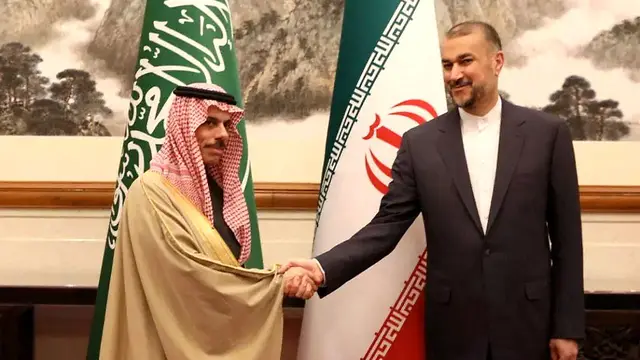Iran and Saudi Arabia are bound for a major milestone in their recent diplomatic offensive as they will soon reopen embassies in each other's capitals, a much expected event to be culminated by the two countries' cooperation from high-level meetings to Sudan evacuations and their agreeing to a deal in Beijing in March.
The two erstwhile Middle East rivals, which had been at odds with one another for decades, had consistently found themselves on opposing sides in conflicts in the region. Their straining ties hit the bottom in 2016 when Sunni kingdom Saudi Arabia cut diplomatic ties with Shiite-dominated Iran in response to the attacks on Saudi diplomatic missions in Iran following Riyadh's execution of a Shiite cleric.
However, the deal brokered by China has set off a series of diplomatic moves the two regional powers made to resume ties after a seven-year hiatus.
In Sudan, where an ongoing conflict has triggered waves of evacuations of foreign nationals, the Saudi navy pulled dozens of Iranian citizens out of the war-stricken country, a move hailed by Tehran as "a positive event" thanks to Saudi-Iranian cooperation.
The evacuation followed the two countries' foreign ministers agreeing to multiple rapprochement steps in Beijing and Iran sending an invitation to Saudi Arabia's King Salman bin Abdulaziz Al Saud for a state visit.
The restoration of their ties has major implications in a region beset by turbulence and rivalry. It has the potential of ending a war in Yemen as both countries wield considerable sway over the warring camps. Recent talks and prisoner exchanges between Saudi Arabia and the Iran-backed Houthi rebel group, which came after the Beijing agreement, marked a step further in their push for peace.
Growing detente could also benefit Syria, Lebanon, Iraq and Bahrain, where both Saudi Arabia and Iran have political, economic, religious and cultural linkages to rival factions, albeit to different degrees.
Syria, which had been subject to a near-isolation in the Arab world and received military support as well as economic aid from Iran, was readmitted by the Arab League on Sunday amid a flurry of normalization of ties between Syria and the countries including Saudi Arabia.
In Lebanon, a prolonged economic and political gridlock could be eased should the country follow Iran's footsteps in fixing ties with Saudi Arabia, a rich trading partner which banned exports from Lebanon due to frustration over the growing influence of Shiite group Hezbollah.
Hopes are also raised for a resumption of ties between Iran and Bahrain, where tensions are high between Shiite and Sunnis Muslims. Iraq, another mediator in the Iran-Saudi deal, could boost its regional standing and benefit from more Saudi assistance.
Peace pusher
The role that China played in unleashing this wave of normalization deals in the Middle East, which is in accordance with the Beijing-proposed Global Security Initiative, has won recognition and praise among international observers, while some also suggest that China could play an even larger role in pushing for global peace.
China does not pick sides and its flexibility enables it to be friends with every country in the Middle East, said Victor Gao, vice-president of the think tank Center for China and Globalization, at a CGTN forum on global security.
"This is an agreement on the principles of conflict resolution between two states rather than an agreement on the solutions to be reached," Yasmine Farouk, a nonresident scholar in the Middle East Program at the Carnegie Endowment for International Peace, wrote in a piece published by the organization. "It reiterates recurrent Saudi and Chinese attachment to norms such as nonintervention in the domestic affairs of nations that have been constant pillars of the Sino-Saudi partnership since 2006, shown in their joint statements, actions within the UN system, and in China's Global Security Initiative," Farouk added.
Referring to China's stance in supporting the strategic autonomy of Middle Eastern countries, Hussein Askary, the West Asia coordinator for the Schiller Institute in Sweden, said "from this Iran-Saudi agreement, we will see this model (China's way of diplomacy) more and more concrete."
"China is redefining the concept of development, redefining the concept of security and global governance," Askary said.
(CGTN)
 简体中文
简体中文

